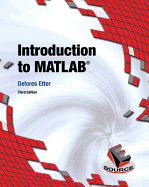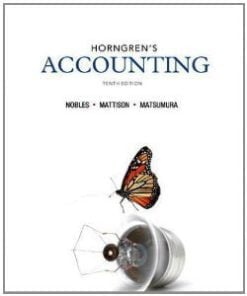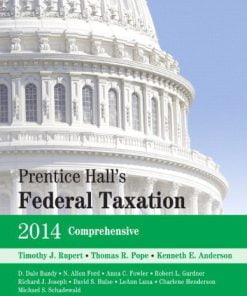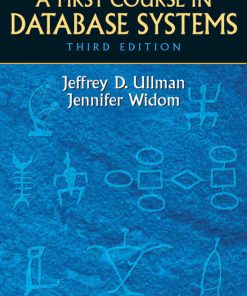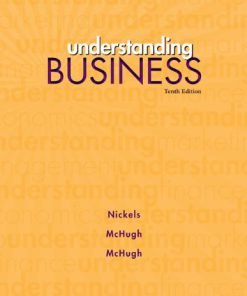Solution Manual for Essentials of Educational Psychology: Big Ideas To Guide Effective Teaching (Subscription), 5th Edition
$35.00 Original price was: $35.00.$26.50Current price is: $26.50.
Solution Manual for Essentials of Educational Psychology: Big Ideas To Guide Effective Teaching (Subscription), 5th Edition
Instant download Solution Manual for Essentials of Educational Psychology: Big Ideas To Guide Effective Teaching (Subscription), 5th Edition pdf docx epub after payment.
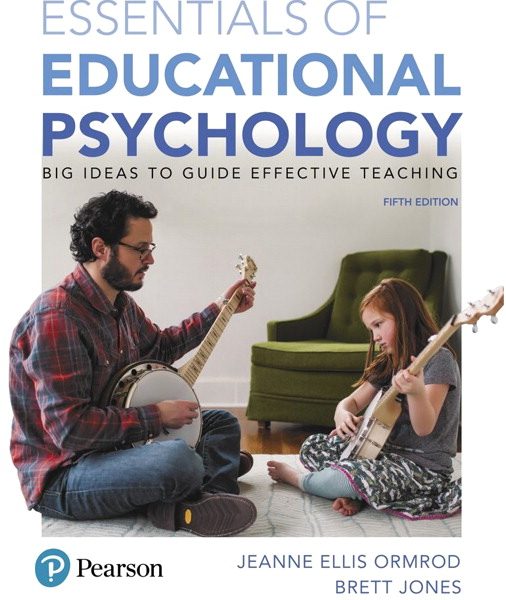
Product details:
- ISBN-10 : 0134522095
- Product Dimensions : 8.4 x 0.8 x 10.8 inches; 2.15 Pounds
- Publication date : February 2, 2017
- Publisher : Pearson; 5 edition
- ISBN-13 : 978-0134522098
- Author: Jeanne Ellis Ormrod; Brett D. Jones
While generally shorter than competing educational psychology textbooks, Essentials of Educational Psychologystill provides a comprehensive overview of theories, research, and educational implications related to learning and cognition, motivation, child and adolescent development, instructional methods, classroom management, and assessment. Each chapter is organized around three to six Big Ideas, and each Big Idea is then divided into several more specific bold-faced principles or recommendations. Widely acclaimed for its conversational writing style, the book provides readers with a clear and easily understood picture of the psychological principles that impact teaching and learning. The Enhanced Pearson eText in Pearson MyLab Education includes dozens of hotlinks to illustrative classroom videos, animated video explanations of difficult concepts, interactive application exercises, self-check quizzes, and optional supplementary readings. Instructors have access to numerous supplementary materials to assist them in their instruction and assessments, including PowerPoint slides, an Instructor’s Manual and accompanying PowerPoint slides, and a Test Bank of multiple choice and short answer questions aligned with each chapter and Big Idea.
Table of contents:
BRIEF TABLE OF CONTENTS1. Introduction to Educational Psychology
2. Learning, Cognition, and Memory
3. Complex Cognitive Processes
4. Learning in Context
5. Motivation and Affect
6. Cognitive Development
7. Personal, Social, and Moral Development
8. Instructional Strategies
9. Strategies for Creating an Effective Classroom Environment
10. Assessment Strategies
DETAILED TABLE OF CONTENTS
1. Introduction to Educational Psychology
Using Research Findings to Make Instructional Decisions
Developing as a Teacher
Strategies for Learning and Studying Effectively
2. Learning, Cognition, and Memory
Thinking and Learning in the Brain
Learning as Active Construction
How Human Memory Operates
Why Learners May or May Not Remember What They Have Learned
Promoting Effective Cognitive Processes
Supporting Optimal Brain Functioning
Remembering the Limitations of Attention and Working Memory
Encouraging Effective Long-Term Memory Storage Processes
Facilitating Retrieval
Monitoring Students’ Progress
3. Complex Cognitive Processes
Self-Regulation and Metacognition
Effective Self-Regulated Learning
The Roles of Metacognition
Transfer
Problem Solving and Creativity
Critical Thinking
Promoting Self-Regulation Skills and Metacognitive Development
Creating a Classroom Environment that Nurtures Complex Processes.
4. Learning in Context
Immediate Stimuli as Context
Social Interaction as Context
Culture, Society, Technology and Academic Domains as Contexts
Culture as Context
Society as Context
Technology and Media as Contexts
Academic Content Domains as Contexts
How Learners Modify Their Environments
Providing Supportive Contexts for Learning
Encouraging Productive Behaviors
Providing Physical, Social, and Technological Support for Effective Cognitive Processes
Taking Students’ Broader Cultural and Socioeconomic Context into Account
5. Motivation and Affect
The Nature of Motivation
Basic Human Needs
Cognitive Factors in Motivation
Affect and its Effects on Motivation and Learning
Promoting Motivation and Productive Affect
Strategies That Empower Students
Strategies That Demonstrate the Usefulness of Activities
Strategies That Foster Success
Strategies That Stimulate Interest
Strategies That Show and Promote Caring
Strategies That Generate Productive Affect for Learning
6. Cognitive Development
General Principles of Development
Developmental Processes
Trends in Cognitive Development
Intelligence
Addressing Students’ Developmental Needs
Accommodating Developmental Differences and Diversity
Fostering Cognitive Development in All Students
7. Personal, Social, and Moral Development
Personality and Sense of Self
Peer Relationships
Social Cognition
Moral and Prosocial Development
Promoting Personal, Social, and Moral Development
Fostering Personal Development
Encouraging Effective Social Cognition and Interpersonal Skills
Promoting Moral Reasoning and Prosocial Behavior
Supporting Students Who Face Exceptional Personal or Social Challenges
8. Instructional Strategies
Planning Instruction
Conducting Teacher-Directed Instruction
Conducting Learner-Directed Instruction
General Instructional Strategies
9. Strategies for Creating an Effective Classroom Environment
Creating an Environment Conducive to Learning
Expanding the Sense of Community Beyond the Classroom
Reducing Unproductive Behaviors
Addressing Aggression and Violence at School
10. Assessment Strategies
Using Assessments for Various Purposes
Guiding Instructional Decision Making
Diagnosing Learning and Performance Problem
Determining What Students Have Ultimately Learned from Instruction
Evaluating the Quality of Instruction
Promoting Learning
Enhancing Learning through Classroom Assessment Practices
Important Qualities of Good Assessment
Informally and Formally Assessing Students’ Progress and Achievements
Conducting Informal Assessments
Designing and Giving Formal Assessments
Evaluating Students’ Performance on Formal Assessments
Summarizing Students’ Achievement with Grades and Portfolios
Assessing Students’ Achievement and Abilities with Standardized Tests
people also search:
Essentials of Educational Psychology: Big Ideas To Guide Effective Teaching, 5th Edition
Essentials of Educational Psychology: Big Ideas To Guide Effective Teaching, 5th Edition pdf
Essentials of Educational Psychology: Big Ideas To Guide Effective Teaching
what is educational psychology and its importance
important topics in educational psychology
Related products
Solution Manual
Prentice Hall’s Federal Taxation 2014 Comprehensive Rupert 27th Edition Solutions Manual
Solution Manual
Solution Manual for Introduction to Electrodynamics, 4/E 4th
Solution Manual
Solution Manual for Absolute C++, 5/E 5th Edition Walter Savitch
Solution Manual
Solution Manual
Solution manual for Accounting: Tools for Business Decision Making Kimmel Weygandt Kieso 5th Edition
Solution Manual
Understanding Business Nickels 10th Edition Solutions Manual




